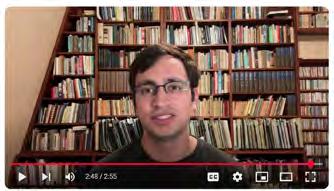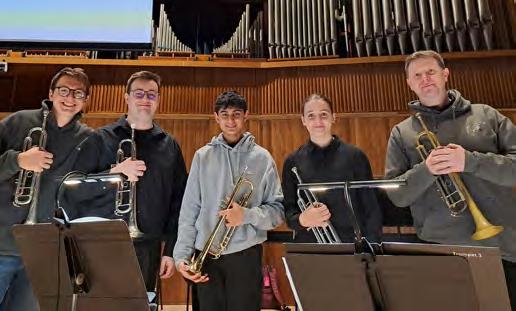LPO Showcase free performance
Friday 21 February 2025 | 6.00pm
Southbank Centre’s Royal Festival Hall
Ensemble of LPO Junior Artists, Foyle Future Firsts & LPO musicians
Matthew Lynch conductor
Vaughan Williams English Folk Song Suite (10’)
Eliana Echeverry Another Day in London Town (world premiere) (5’)
Arson Fahim Forbidden Dances (European premiere) (7’)
Bartók Hungarian Pictures (11’)
Welcome
Welcome to this evening’s Showcase performance presenting some of our most exciting emerging talent. The ensemble features the London Philharmonic Orchestra’s Junior Artists 2024/25, playing alongside Junior Artist alumni, Foyle Future First players and LPO musicians – all under the baton of our Fellow Conductor, Matthew Lynch.
LPO Junior Artists is our year-long programme for eight talented young musicians from backgrounds currently under-represented in professional UK orchestras. Through this initiative, we are working to break down barriers and ensure that the future of the orchestral industry reflects the society in which we live. Junior Artists become part of the LPO family for a year, getting to know our musicians, staff and artists, as well as members of our Rising Talent schemes. They are offered training, advice and professional insights, and take part in events to inspire younger generations of musicians. Many alumni have gone on to study music at conservatoire or university, and we are delighted to see some beginning to emerge into the profession.
Tonight’s programme takes as its inspiration the music of people and places. The performance is bookended by the English folk song-inflected Suite by Vaughan Williams and the vivid Hungarian Pictures by Bartók, both seminal composers who took great inspiration from the folk music of their homelands. In between we will hear two contemporary works which are also inspired by places: an homage to this very city in a world premiere by Eliana Echeverry (former LPO Young Composer); and Forbidden Dances by Afghan composer Arson Fahim, which is both a celebration of the art and culture of his homeland, and an expression of pain at its repression by the current regime.
We hope you enjoy this evening’s Showcase performance, and we would like to extend a heartfelt thank you to those supporters whose generosity and vision to nurture the next generation of musical talent make our Rising Talent programmes possible.
On stage tonight
Conductor
Matthew Lynch
LPO Fellow Conductor 2024/25
First Violins
Kate Oswin*
LPO chair supported by Eric Tomsett
Rebecca Nicolas†
Laura Gutierrez Muurisepp‡
Second Violins
Emmanuel Webb#
Maya Patel†
Violas
Melissa Doody#
Kateryna Holiar‡
Cellos
Francis Bucknall*
Ivan Rodriguez Deb‡
Double Bass
James Trowbridge#
Flutes
Diego Jurado Hoshino†
Stewart McIlwham*
Piccolo
Stewart McIlwham*
Oboes
Kara Battley§
Anton Brown‡
Clarinets
Hassan Marzban†
Thomas Watmough*
LPO chair supported by Roger Greenwood
Bassoons
Keane Lui#
Nahuel Angius-Thomas‡
Horns
Hannah Williams#
Martin Hobbs*
Trumpets
Nayan Shah†
Carys Wood†
Trombones
Benjamin Abraham†
David Whitehouse*
Tuba
Callum Davis#
Percussion
Oliver Yates*
Nathan-Asher Oriakhi†
Timpani
Charlie Hodge#
Harp
Sue Blair**
† LPO Junior Artist 2024/25
‡ LPO Junior Artist alumni
# Foyle Future First 2024/25
§ Foyle Future First reserve 2024/25
* LPO member
** LPO guest
With thanks to LPO Junior Artist Mentors 2024/25:
Kate Oswin (violin), Stewart McIlwham (flute), Thomas Watmough (clarinet), Paul Beniston (trumpet), David Whitehouse (trombone), Andrew Barclay (percussion).
The LPO Junior Artists Programme 2024/25 is generously funded by the TIOC Foundation, Maria Bjӧrnson Memorial Fund and The John S Cohen Foundation.
The LPO Conducting Fellowship 2024/25 is generously supported by Patricia Haitink with additional support from Gini and Richard Gabbertas.
The Foyle Future Firsts Development Programme 2024/25 is generously supported by the Foyle Foundation with additional support from the Barbara Whatmore Charitable Trust and individual chair supporters. Foyle Future First instrument chairs are kindly supported by David Burke & Valerie Graham (clarinet), Michelle Crowe Hernandez (tuba), John & Sam Dawson (percussion), Marie Power (piano), and Judy Wrightson & Tony Llewellyn (violin).
Programme notes
Ralph Vaughan Williams (1872–1958)
English Folk Song Suite (1923)
1 March: ‘Seventeen Come Sunday’
2 Intermezzo: ‘My Bonny Boy’
3 March: ‘Folk Songs from Somerset’
My Junior Artists experience has been incredible so far. I feel so lucky to be able to hear the LPO perform regularly to learn as a musician hearing-wise, and also the opportunity to play with the best people has been amazing.
Diego (flute), LPO Junior Artist
Eliana Echeverry (born 1990)
LPO Young Composer 2023/24
Another Day in London Town (world premiere)
Commissioned for the LPO Junior Artists
It’s really cool to play something brand new and written for just the eight of us. There’s a lot of recurring motifs, overlapping cross-rhythms, and it has a sort of Latin feel.
Rebecca (violin), LPO Junior Artist
Vaughan Williams’s English Folk Song Suite is one of the composer’s most beloved works, an evocative celebration of England’s rich folk music heritage. Written in 1923, originally for military band, the Suite captures the essence of traditional tunes that were once passed down through generations in villages, fields and pubs. Vaughan Williams, a passionate collector of English folk songs, sought to preserve these melodies at a time when they were in danger of disappearing. With this Suite, he skilfully brought those simple, heartfelt tunes into the concert hall, arranging them with warmth and imagination.
The Suite unfolds in three movements, each brimming with character. The opening march, ‘Seventeen Come Sunday’, is based on a sprightly song about a young lad eager to marry his sweetheart. Its jaunty rhythm and playful energy set the tone for the piece. The second movement, ‘My Bonny Boy’, is a more introspective affair. A mournful solo melody, tinged with longing, unfolds before blossoming into a lively interlude that evokes a pastoral dance. The final movement, ‘Folk Songs from Somerset’, is a lively medley of tunes, ending the Suite on a jubilant note.
Eliana Echeverry is a Colombian composer based in London. Her background covers a wide range of traditions, from Latin American folkloric music to jazz, classical music, Carnatic music, pop and rock, and she integrates elements from these cultures into her unique sonic universe. Eliana has worked with renowned artists around the world, from collaborations with fashion designers to commissions for electric viola, contemporary opera, and music for big bands. She was an LPO Young Composer in 2023/24, and her work Diásporas was premiered at the LPO Debut Sounds concert in June 2024. Tonight’s work, Another Day in London Town, was developed with input from the Junior Artists, who took part in consultation and creative music sessions to devise the piece with Eliana. She writes:
‘Another Day in London Town draws inspiration from jazz, Stravinsky’s compositions, and minimalism, reflecting the broad scope of the composer’s influence. The piece’s eclectic mix of musical languages mirrors the diversity of cultures and people that define the city. It serves as a sonic portrait of London – an energetic metropolis brimming with contrasts and untold stories. A single day in the city can encompass a full spectrum of emotions and sensations, from the frenzy of central London and the bustle of the Tube to the serene calm of its parks, which offer an oasis of peace amidst the everyday chaos of this vibrant, unique place we call home.’
Arson Fahim (born 2000)
Forbidden Dances (2023) (European premiere)
Scan the QR code to watch a video of Arson introducing his Forbidden Dances.
Béla Bartók (1881–1945) Hungarian Pictures (1931)
1 An Evening in the Village
2 Bear Dance
3 Melody
4 Slightly Tipsy
5 Swineherd’s Dance
This piece is so lively and energetic. Listen out for the contrasting clarinet solos which are really characterful.
Hassan (clarinet), LPO Junior Artist
Arson Fahim is an Afghan pianist, composer and conductor. He graduated from the Afghanistan National Institute of Music in 2021, and, only two weeks before the Taliban took control of the country and once again banned music, moved to the US to study at the Longy School of Music in Massachusetts, where he was awarded a scholarship. Arson believes in the power of music to bring social change. His music is inspired by the tragedies in Afghanistan and beyond, and his compositions are a way for him to protest and raise his voice for justice. He writes:
‘Afghanistan has been home to a rich and vibrant tapestry of aweinspiring traditional art forms that captivate all who experience them. From exhilarating dances that radiate sheer joy to breathtakingly beautiful dresses adorned in a kaleidoscope of colours, to mesmerising music that resonates with profound emotion, our cultural heritage has flourished for centuries, intertwining with our very identity. Tragically, however, these vital forms of self-expression are all but forbidden under the Taliban’s inhumane regime. As a symbol of perseverance and defiance, Forbidden Dances draws inspiration from the traditional dances and music of Afghanistan that I so deeply cherish, infused with the pain of being robbed of these artistic and expressive freedoms.’
Like Vaughan Williams’s English Folk Song Suite, Bartók’s Hungarian Pictures demonstrates the composer’s lifelong fascination with folk music. While Vaughan Williams’s Suite evokes the rolling English countryside, Bartók’s paints a lively picture of Hungarian villages and traditions. As a composer and ethnomusicologist, Bartók traveled across the Hungarian countryside, collecting and studying the songs and dances of rural communities. These field recordings became the foundation for many of his works, and Hungarian Pictures is an example of how he transformed these folk tunes into something completely unique. Like Vaughan Williams, Bartók didn’t just preserve folk music – he reinvented it, blending traditional tunes with bold harmonies and textures.
Each movement of Hungarian Pictures has its own character: the opening ‘An Evening in the Village’ evokes a tranquil rural scene, while ‘Bear Dance’ pairs a playful, lumbering energy with some quirky rhythms. ‘Melody’ offers a haunting, lyrical moment of reflection, before the suite takes a lively turn with ‘Slightly Tipsy’, full of uneven rhythms and humour. The final movement, ‘Swineherd’s Dance’, is a fiery, foot-stomping finale that brings the suite to an exhilarating close.






